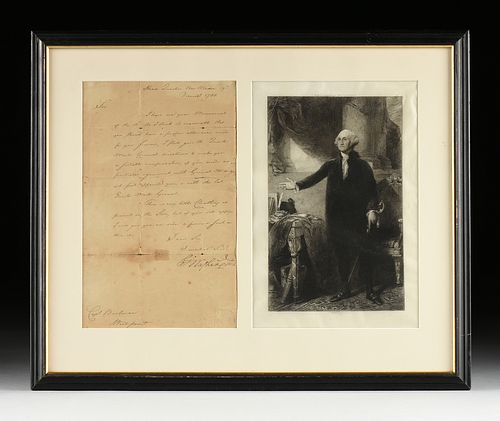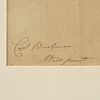GEORGE WASHINGTON (1732-1799) AS COMMANDER IN CHIEF OF THE CONTINENTAL ARMY AT NEW WINDSOR, AUTOGRAPH LETTER SIGNED MANUSCRIPT TO CAPT. BUCHANAN AT WE
About Seller
6116 Skyline Drive, Suite 1
Houston, TX 77057
United States
Simpson Galleries has been serving Houston’s need for the very best in antique sales venues for more than fifty years. Beginning in 1962, William Simpson started educating himself and others in the art of collecting fine antiques and art objects. Simpson Galleries' commitment to excellence and accur...Read more
Two ways to bid:
- Leave a max absentee bid and the platform will bid on your behalf up to your maximum bid during the live auction.
- Bid live during the auction and your bids will be submitted real-time to the auctioneer.
Bid Increments
| Price | Bid Increment |
|---|---|
| $0 | $25 |
| $500 | $50 |
| $1,000 | $100 |
| $2,000 | $250 |
| $5,000 | $500 |
| $10,000 | $1,000 |
| $20,000 | $2,500 |
| $50,000 | $5,000 |
| $100,000 | $10,000 |
| $200,000 | $25,000 |
About Auction
Feb 6, 2021
Fine Art & Antiques - featuring works from the estate of prominent collector David E. Brauer. Simpson Galleries online_auctions@simpsongalleries.com
- Lot Description
GEORGE WASHINGTON (1732-1799) AS COMMANDER IN CHIEF OF THE CONTINENTAL ARMY AT NEW WINDSOR, AUTOGRAPH LETTER SIGNED MANUSCRIPT TO CAPT. BUCHANAN AT WEST POINT, NEW YORK, DECEMBER 19, 1780, hand inscribed ink on cream laid paper, signed L/R, "G. Washington," 13 1/8" x 8 1/4"; framed together with an engraving on rice paper by William Harry Warren Bicknell (American 1860-1947), "Published and copyrighted 1897," by A.W. Elson & Co., Boston, U.S.A.," 13 1/8" x 8 7/8". Note: Transcription: "Head Quarters, New Windsor, 19 December 1780. Sir, I have read your Memorial of the 15th. As I think it reasonable that you should have a proper allowance made for your services, I shall give the Quarter Master General directions to make you a suitable compensation, if you made no particular agreement with General McDougall, who first appointed you, or with the late Quarter Master General. There is very little clothing at present in the store, but if you will supply, I will give you an order to procure such as there is. I am sir, Your most obt. Servt, G. Washington. Capt. Buchanan. West point."George Washington's aide-de-camp, Tench Tilghman (1744-1786), most likely pens the contents of the letter from New Windsor. New Windsor was selected as Washington's new Head Quarters on December 8, 1780, just eleven days after George Washington's arrival. The "West Point" location referenced by George Washington is a strategic, fortified area on the banks of the Hudson River in New York, known after 1780 as Fort Clinton. The fort was previously named Fort Benedict, but that soon changed after Benedict Arnold's treasonous defection just three months before this letter was written; the reader should note George Washington refers to this area as "West point," and specifically does not name Benedict Arnold (1741-1801) at all, for whom the fort was once a namesake. Arnold only three months previous in September 1780 was caught in a plot to surrender West Point to the British. The tension by the act of espionage was likely still high. Had West Point been captured by the British, as a result of Benedict Arnold's betrayal, then the American Revolutionary War may have ended dramatically different. The successful defense of West Point proved a critical win for George Washington and the Continental Army. Today we hardly consider the importance of an elevated vantage point, certainly far much less than in the 18th century. Fort Clinton directly guarded both Fort Putnam and the Redoubt Four watchpoint, allowing the Continental Army immeasurable advantage concerning incoming enemy ships on the Hudson River. Writing to the very fort Benedict Arnold attempted to covertly surrender to the British, the present letter illuminates this moment of success for George Washington as he writes to West Point, which he nearly lost just three months prior. This moment in history was without a doubt a definitive tipping point in securing the future of the United States of America.The present letter is also a financial record, as George Washington requests clothing for the store near his location, and reassures Captain Buchanan that financial allowances will be made in response to his request. The intended reader is attributed to General William Buchanan (1732-1804) of Baltimore, Maryland; he is recorded as serving as Commissary General of Purchases for the Continental Army. George Washington specifically mentions Major General Alexander McDougall (1731-1786) impressing the importance of the military chain of command upon the reader. General McDougall helped build the state-of-the-art Fort Clinton at West Point with Tadeusz Ko?ciuszko from 1778-1780. George Washington even writes that any agreement set forth by McDougall or the Quartermaster General (probably Timothy Pickering [1745-1829]) would be honored by Washington, further insisting upon his respect for following the chain of command. The documented complaint by Capt. Buchanan to George Washington was only one in a series of grievous financial arrears owed to Revolutionary war veterans and service members, including back pay and pensions, which came to a pivotal head during the Newburgh Conspiracy a few years after this letter was composed. The present manuscript is an example of the financial insecurity found among Revolutionary army ranks as the American Revolutionary war neared the end. It is also evidence of the unwavering, direct military leadership George Washington endeavored to provide Revolutionary soldiers at the end of the 18th century. Emblematic of George Washington's grounded fortitude in commanding the Continental Army through the perils of the American Revolution; his grueling work ultimately laying the foundation for his later service as first President of the United States; the letter presents the reader with the realities faced by servicemen and the future President nearing the close of the American Revolution. Reference: "Calendar of the Correspondence of George Washington, Commander in Chief of the Continental Army with the Continental Congress, Prepared from the Original Manuscripts in the Library of Congress by John. C. Fitzpatrick, Division of Manuscripts, Washington, Government Printing Office, 1906." A special thanks to the Library of Congress for publishing the "George Washington Papers, Series 5, Financial Papers: George Washington's Revolutionary War Expense Account, 1775-1783," page 32-35 and notes. Provenance: Property of a Texas Gentleman.The letter with some expected foxing, an old tape piece lower center, tears at lower horizontal crease and losses mostly at right, with rebuilding in corner, right edge probably trimmed, uneven toning, likely in need of conservation mat and framing, but overall in good to very good condition, wear commensurate with age and use. The engraving has some paper waving but overall in very good condition, wear commensurate with age. Simpson Galleries strongly encourages in-person inspection of items by the bidder. Statements by Simpson Galleries regarding the condition of objects are for guidance only and should not be relied upon as statements of fact and do not constitute a representation, warranty, or assumption of liability by Simpson Galleries. All lots offered are sold "AS IS." NO REFUNDS will be issued based on condition.
Condition
- Shipping Info
-
**SIMPSON GALLERIES, LLC. DOES NOT PROVIDE SHIPPING SERVICES OR SHIPPING QUOTES.** Shipping may be secured through - The UPS Store: auctions@epicpartnershipco.com 281-764-9551, The UPS Store: store1733@theupsstore.com 713-942-7775, PACK-N-SEND: sales@pack-n-send.com 713-266-1450, ACTS Crating and Transportation Services: crating@actsintl.com 713-869-2269, NAVIS Pack & Ship: 17013tx@gonavis.com 713-352-3038, A Better Mover Inc: travis@abettermoverinc.com or abettermover@yahoo.com 404-754-0111, or the shipper of your choice. We are open for shipper pick-up Tuesday - Thursdays from 10 am to 3 pm or by appointment.
-
- Buyer's Premium



 EUR
EUR CAD
CAD AUD
AUD GBP
GBP MXN
MXN HKD
HKD CNY
CNY MYR
MYR SEK
SEK SGD
SGD CHF
CHF THB
THB





















